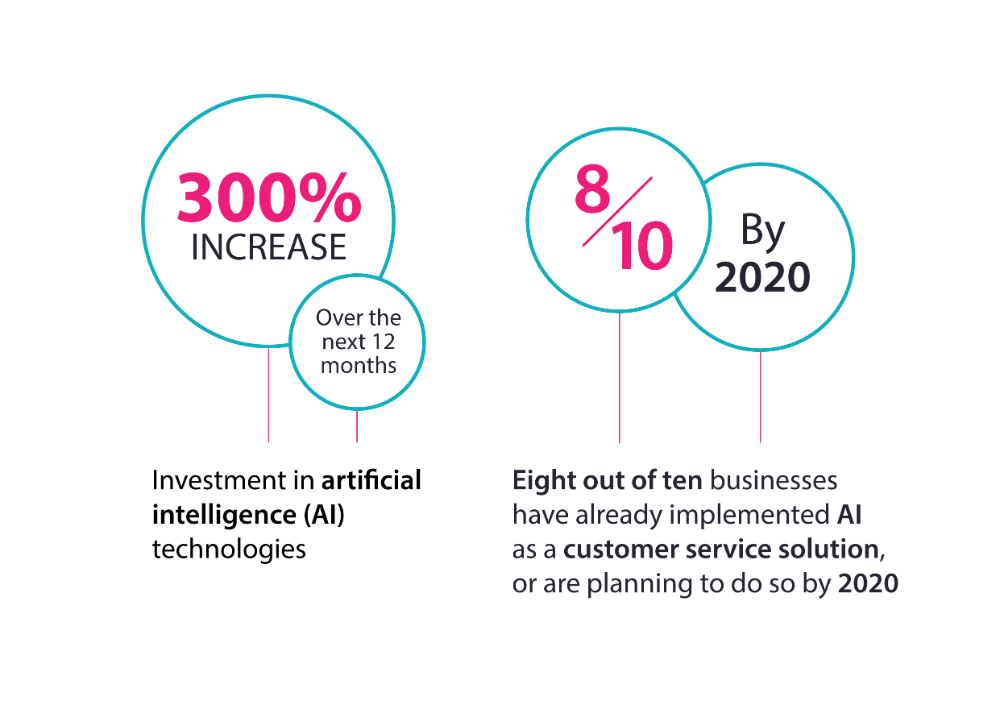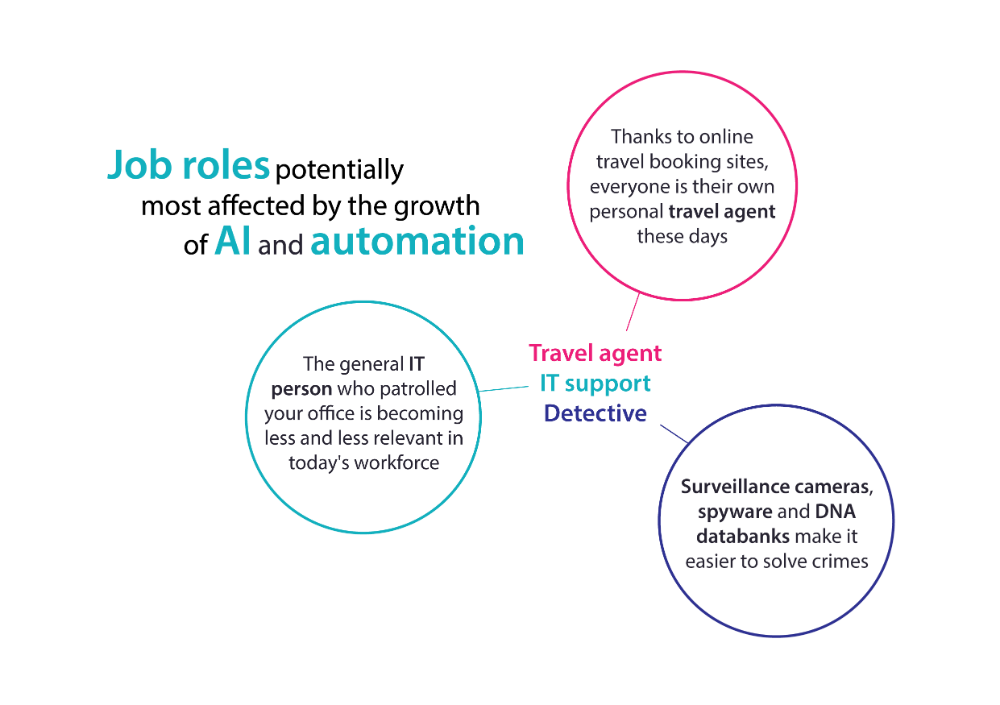

In the ever onward march of modern technology, we humans have sometimes felt uncomfortable about the increasing automation of telecommunications – from machines calling us with recorded messages to switchboard operators replaced by numbered menus to choose from.
However, we seem to be turning a corner, with many people now happy to communicate with devices such as chatbots. For example, a report from media data specialists Comscore which looked at the future of voice technology in the US, found that half of smartphone users engage with voice technology and messaging apps on their device, and one in three do so on a daily basis.

According to Call Centre Helper investment in AI technologies will increase by more than 300 per cent over the next year, and eight out of ten businesses have already implemented Artificial Intelligence as a customer service solution, or are planning to do so by 2020.

The impact of AI on the human workforce
A blog by NewGenApps has looked at the top 11 ways that companies are now using AI in their business processes, and they say that “What started as a rule-based automation is now capable of mimicking human interaction. It is not just the human-like capabilities that make artificial intelligence unique. An advanced AI algorithm offers far better speed and reliability at a much lower cost … compared to its human counterparts.”

They highlight chatbots, e-commerce, cybersecurity, logistics, and streamlined manufacturing as among those areas where AI can enhance business processes, and also focus on how the use of AI in these areas can free up human staff to concentrate on the more complex aspects of their job roles – adding value to their work and exceeding consumer expectation.
A similar report from Work + Money looks at the 25 job roles potentially most affected by the growth of AI and automation. The experts they called on included John Pugliano, author of “The Robots are Coming: A Human's Survival Guide to Profiting in the Age of Automation,” who sees plenty of white-collar jobs being threatened by automation.

The professions highlighted in the report include travel agent, mortgage broker, lawyer, IT support, financial planner, data entry, and even detective. In most cases the jobs won’t disappear completely, but automation and machine learning will take over some aspects, freeing up the human workforce to focus more on those areas that can’t be addressed through algorithms. For example, a detective won’t need to spend hours searching through CCTV when AI can be used to collate all the relevant coverage.
While customer service doesn’t make it to the list, one facet does, in the role of switchboard operator. According to the report, the number of switchboard operators has been declining for decades and is projected to fall another 33 per cent in the next 10 years in the US. Texting, voice mail and other AI enhanced systems could make this job obsolete even sooner than projected. The authors state they have even heard of an office using Amazon’s Alexa to direct phone calls to the right recipient.
AI and customer service
With the new AI supported telephony systems now available, customer service agents may consider AI something to be feared, but in reality it’s more the case that putting human call handlers together with AI will facilitate a better running function, which will benefit the call handlers, improve customer service interactions and raise customer satisfaction.
Modern AI systems mean the caller doesn’t just face an implacable machine demanding they choose from a set number of options; a customers questions can now be serviced to varying degrees by AI collecting data, asking follow-up questions, providing set responses in real time and then either taking a final instruction or putting the caller through to a live contact center agent to complete the call objectives. If planned well, this kind of automation can deliver a valuable part of a great customer experience.
But it’s in the areas that AI isn’t engaging with customers directly that it can make the biggest difference. In the back office environment in which call handlers work, AI can really come into its own, supporting efficient automation and giving call handlers the tools to process, search, analyse and collect data and opinion like never before.
It does this by interrogating singular or even multiple CRM systems based on certain keystrokes or voice keys to pull up data quickly and accurately to fulfil requests and provide an overall view of a caller’s data and status. This makes it much easier for call handlers to automatically exchange information between the different systems that they use. This can make a big difference in avoiding associated pain points when, for example, the system used to book a service engineer is separate from the CRM system.
By making the work behind the scenes more efficient for the customer support call handlers, AI can help improve the customer experience through smoother, faster call resolution.
Integrating AI into the existing customer journey
According to Mycustomer, “When it’s noticeable that a machine is providing service, and it then becomes complicated to chat with a human, customers will (and have already) grow in their distrust of AI. For organisations to implement artificial intelligence well, it means integrating their AI and automation into their existing customer journey in such a way that the tech-assisted experiences happen alongside the human-assisted ones.”

They add: “The question then becomes, ‘which interactions and touch points are best left for AI, and what should be addressed by live agents?’”. They suggest that highly repetitive or predictable types of interactions are universally appealing for automation or bots because those interactions often demotivate and bore human agents. By allowing call handlers to instead focus on the more complicated and complex interactions, companies can in turn meet customer expectations and deliver better employee satisfaction.
AI is not just for big business
A direct investment in the systems required to take advantage of AI may be beyond the reach of many small and medium companies, but it’s still possible to join this technological revolution by outsourcing the functions or parts of functions that could benefit from its use and to help make a positive impact on the bottom line.
Whether you’re a travel agent, mortgage broker, lawyer, financial planner, or even a detective, if you look online there’s likely to be a supplier who can enhance your work through the support of AI. And any business with a call handling, help desk or customer service function will find an external supplier whose investment in the most up-to-date technology will support their staff to deliver on the most value-added elements of their work, lifting their customer service levels above those of their competitors.
We're proud to announce the launch of our AI Receptionist.
This innovative service combines advanced AI technology with natural, human-sounding voices to greet your callers and capture their messages accurately any time, day or night.
Want to hear it in action?
Call 0800 044 3177 now to experience our AI Receptionist Demo for yourself and see just how naturally it handles real conversations.
It’s designed to give your business the same reliability and professionalism that Answer4u is known for, now powered by intelligent automation. If you’re ready to hear what the future of call answering sounds like, give us a call on 08008223344 or click below to contact us online.
Categories
- 24 Hour Call Answering Service (7)
- After Hours Call Answering (5)
- After-Hours Call Answering Service (6)
- Answer-4u (18)
- Artificial Intelligence (5)
- BPO (5)
- Business (67)
- Business Grants (3)
- Business Growth (4)
- Business Owner (6)
- Business Strategy (3)
- Call Diversion (6)
- Call Handling Service (13)
- Charity (2)
- Christmas (6)
- Customer Experience (5)
- Customer Satisfaction (3)
- Customer Service (32)
- Customer Services (8)
- Decision Making (3)
- Diary Management (3)
- Digital Marketing (16)
- Disaster Recovery (5)
- EntrepPhase (7)
- Entrepreneurs (7)
- Finance (2)
- Funding (3)
- HR (6)
- Infographic (2)
- Inspiration (2)
- Leadership (4)
- Marketing (15)
- Marketing Strategy (2)
- Networking (2)
- Other (4)
- Outsourcing (17)
- Phone Etiquette (11)
- Productivity (6)
- Property Management (3)
- Recruitment (7)
- ROI (1)
- Self Improvement (2)
- Small Business (14)
- SME (4)
- Staff Training (2)
- Start-Up (10)
- Technology (3)
- Telephone Answering (14)
- Time Management (4)
- Virtual Assistant (3)
- Virtual Receptionist (14)
- Workforce (9)
- Working Environment (9)
- Workplace (29)





